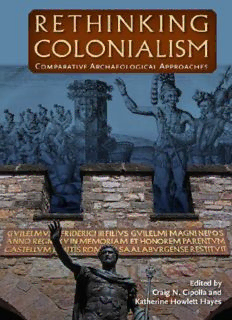
Rethinking Colonialism: Comparative Archaeological Approaches PDF
Preview Rethinking Colonialism: Comparative Archaeological Approaches
Rethinking Colonialism University Press of Florida Florida A&M University, Tallahassee Florida Atlantic University, Boca Raton Florida Gulf Coast University, Ft. Myers Florida International University, Miami Florida State University, Tallahassee New College of Florida, Sarasota University of Central Florida, Orlando University of Florida, Gainesville University of North Florida, Jacksonville University of South Florida, Tampa University of West Florida, Pensacola This page intentionally left blank Rethinking Colonialism Comparative Archaeological Approaches Edited by Craig N. Cipolla and Katherine Howlett Hayes University Press of Florida Gainesville · Tallahassee · Tampa · Boca Raton Pensacola · Orlando · Miami · Jacksonville · Ft. Myers · Sarasota Copyright 2015 by Craig N. Cipolla and Katherine Howlett Hayes All rights reserved Printed in the United States of America on acid-free paper This book may be available in an electronic edition. 20 19 18 17 16 15 6 5 4 3 2 1 Library of Congress Cataloging-in-Publication Data Rethinking colonialism : comparative archaeological approaches / edited by Craig N. Cipolla and Katherine Howlett Hayes. pages cm Includes index. ISBN 978-0-8130-6070-5 1. Colonization—History. 2. Imperialism—History. 3. Nationalism—History. 4. Social history. I. Cipolla, Craig N., 1978- editor. II. Hayes, Katherine Howlett, editor. JV105.R48 2015 325'.3—dc23 2014048348 The University Press of Florida is the scholarly publishing agency for the State University System of Florida, comprising Florida A&M University, Florida Atlantic University, Florida Gulf Coast University, Florida International University, Florida State University, New College of Florida, University of Central Florida, University of Florida, University of North Florida, University of South Florida, and University of West Florida. University Press of Florida 15 Northwest 15th Street Gainesville, FL 32611-2079 http://www.upf.com Contents List of Figures vii List of Maps ix Preface and Acknowledgments xi 1. Introduction: Re-Imagining Colonial Pasts, Influencing Colonial Futures 1 Katherine H. Hayes and Craig N. Cipolla Part I Colonial Structures Past and Present 2. Colonial Consumption and Community Preservation: From Trade Beads to Taffeta Skirts 17 Craig N. Cipolla 3. Globalizing Poverty: The Materiality of Colonial Inequality and Marginalization 40 Paul R. Mullins and Timo Ylimaunu 4. Indigeneity and Diaspora: Colonialism and the Classification of Displacement 54 Katherine H. Hayes 5. Cultural Colonization without Colonial Settlements: A Case Study in Early Iron Age Temperate Europe 76 Peter S. Wells 6. Colonial Encounters, Time, and Social Innovation 99 Per Cornell 7. Rethinking Colonialism: Indigenous Innovation and Colonial Inevitability 121 Stephen A. Mrozowski, D. Rae Gould, and Heather Law Pezzarossi 8. Materializations of Puritan Ideology at Seventeenth-Century Harvard College 143 Christina J. Hodge, Diana D. Loren, and Patricia Capone 9. Working with Descendant Communities in the Study of Roman Britain: Fragments of an Ethnographic Project Design 161 Richard Hingley 10. The Archaeology of Slavery Resistance in Ancient and Modern Times: An Initial Outlook from a Brazilian Perspective 190 Lúcio Menezes Ferreira and Pedro Paulo A. Funari Part II Looking Back, Moving Forward: Comparative Colonialism and the Future 11. Comparative Colonialism and Indigenous Archaeology: Exploring the Intersections 213 Stephen W. Silliman 12. Comparative Colonialism: Scales of Analysis and Contemporary Resonances 234 Audrey Horning List of Contributors 247 Index 249 Figures 2.1. Benjamin Garret Fowler I’s house and grave marker and the shared grave marker of Benjamin Garret Fowler II and his wife, Hannah, Brothertown, Wisconsin 27 2.2. Brothertown ballroom, Brothertown, Wisconsin 34 3.1. A seventeenth-century silver spoon from the town of Oulu 45 3.2. The town of Tornio at the end of the seventeenth century 46 4.1. Wampum (shell beads) produced at Sylvester Manor 58 4.2. Clipped and reworked brass items and obsidian flake recovered at the Little Round Hill site 66 4.3. Interpretive sign, including artist’s renditions, at the Little Round Hill site 67 7.1. Magunco Hill site, foundation of Magunkaquog meeting house, Ashland, Massachusetts 128 7.2. Foundation of the Sarah Burnee Phillips–Sarah Boston farmstead, Grafton, Massachusetts 133 7.3. Cisco Homestead, Hassanamisco Reservation, Grafton, Massachusetts 136 8.1. Commemorative wetu at the location of the Harvard Indian College built in 1655 155 9.1. Agricola by J. Goldar 166 9.2. The Living Frontier event at Corbridge, Northumberland, England, on May 30, 2009 170 9.3. One of the commemorative stones from Coventina’s Well, now at Chesters Museum, Northumberland, England 178 9.4. Offerings on the Roman altar at Carrawburgh, Northumberland, England, in 2012 179 This page intentionally left blank Maps 2.1. Locations of both Brothertown settlements and the seven ancestral reservation communities 18 3.1. Fennoscandia 42 4.1. Eastern U.S. site areas 57 5.1. Principal sites discussed in the chapter 81 6.1. Major sites in the southern Calchaqui highland valley, northwestern Argentina 107 6.2. El Pichao sites, Argentina 109 7.1. Location of the “Praying Indian” communities of Natick, Magunkaquog, and Hassanamesit in Massachusetts and Connecticut 125 7.2. A 1727 land redistribution map showing the Sarah Robins and Peter Muckamaug lot and the Moses Printer lot 132 9.1. Frontiers of the Roman Empire 163 9.2. Britain, with the locations of Hadrian’s Wall, the Antonine Wall, York, and London 165
Description: